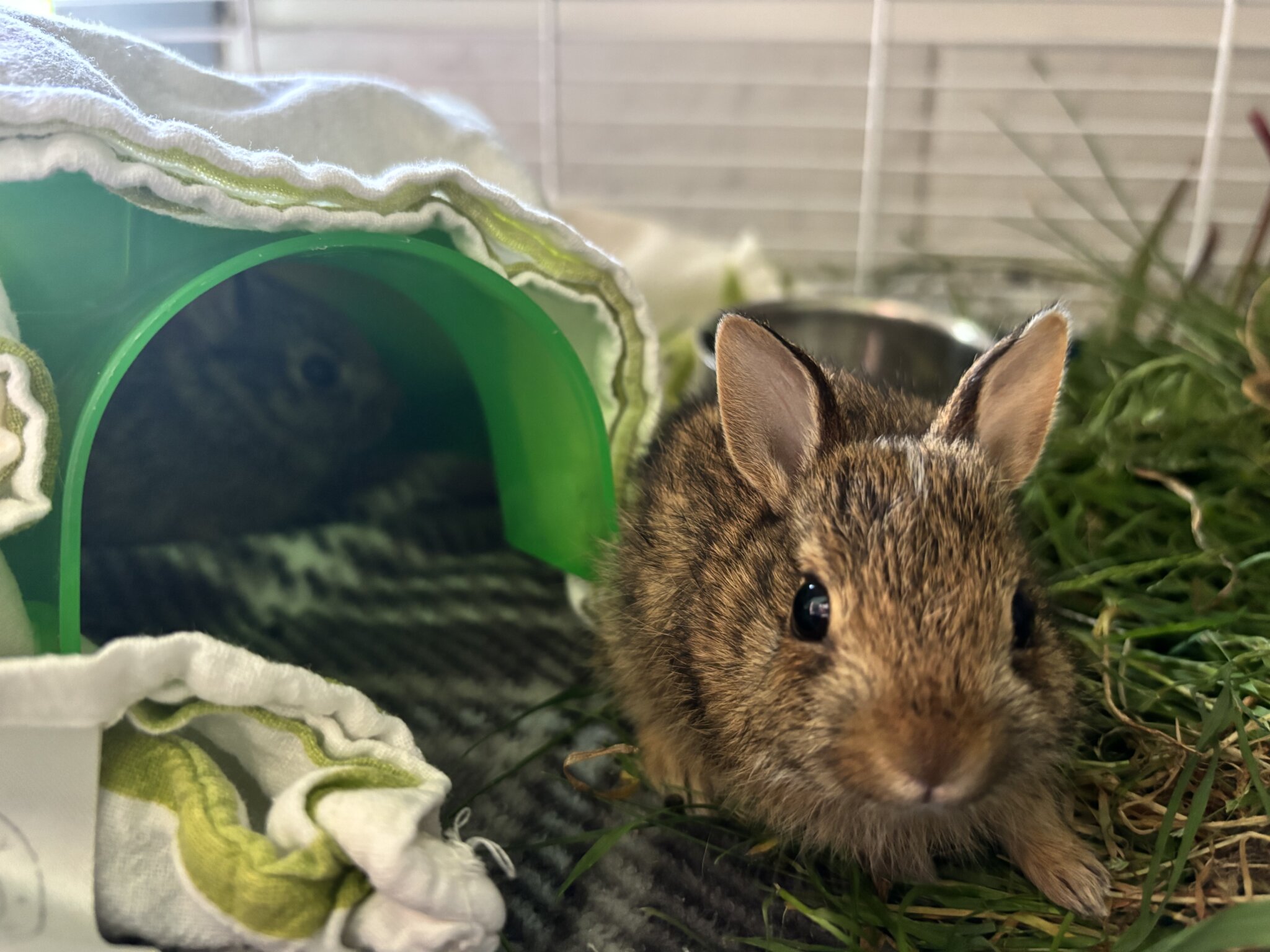Evelyn Alexander Wildlife Has Rehabilitated 39 Eastern Cottontail Rabbits Since January

Making up 16% of their patients, Eastern Cottontail rabbits are one of the Evelyn Alexander Wildlife Rescue Center’s (EAWRC) most prominent, rehabilitated species, with an intake count of 183 rabbits since the beginning of 2024. After 39 successful rehabilitations, 34 transfers and 12 currently in care, Noelle Dunlop, director of development of the EAWRC and licensed wildlife rehabilitator, describes the difficulties in rehabilitating young rabbits.
On May 23, Dunlop and another wildlife rescuer responded to a call made by a local summer camp in Southampton, stating they found two baby bunnies while cleaning up their grounds for mulch. The summer camp employees found the rabbits hidden in the branches after accidentally destroying their nest while landscaping.
“If the nest was still intact, we would have been able to put the bunnies back,” Dunlop says, “Yet once the nest is destroyed, the mother will be unable to find her babies.”
The two newborn baby bunnies were rescued, both safe and protected in a makeshift container, with the help of the summer camp employees, and immediately were transferred to the EAWRC for rehabilitation. Unfortunately, Dunlop suspects that “there might have been other rabbits lost in the mulch and the leaves, since most mothers give birth to way more than two young at a time.”

After the rabbits were transferred to the EAWRC, Dunlop took charge of caring for the two newborn bunnies, as the 12 rabbits currently rehabilitating in the hospital are cared for by Grace DeNatale, animal care assistant, and Adrienne Gillespie, hospital supervisor. While there are many successful rehabilitation stories for Eastern Cottontails, Dunlop describes them as very difficult to care for, as they are “highly stressed animals.” Since mothers only feed their young twice a day, in the morning and at night, the amount of contact the young have is minimal. However, in rehabilitation, “employees have to feed, clean, weigh, and bathe the babies, which causes a lot of stress for both the baby rabbit and the employee,” Dunlop adds.
Two weeks into the rescue of the two baby bunnies, Dunlop noticed one was neither growing nor gaining weight, almost a quarter smaller than its sibling; sadly, it later passed. A likely cause was not enough colostrum, as “the first milk from the mother is vital to the health of the baby,” Dunlop says. Since the two were found as newborns, it’s likely that the rabbit that died in rehabilitation did not receive enough, or any, colostrum from the mother, which is vital for its nutrient levels. Another possible cause is a failure to digest milk properly, since in captivity the milk is not an exact replica of the richness of the mothers. Due to the delicate environments Eastern Cottontail rabbits require, this small difference can severely impact the baby.
Dunlop adds that “Generally, we see success rates with rabbits not as high as squirrels, birds, and other species because of their delicate digestive system and sensitive stress levels.”
Just recently, despite the difficult odds and the loss of its sibling, the second rabbit was successfully rehabilitated, and Dunlop released it in a quiet, rabbit-friendly location in Manorville. She is still working hard to rehabilitate and release five other young rabbits currently in her care.
With such difficulty in raising and rehabilitating these creatures successfully, the EAWRC recommends that if a nest were to be found, to let it be. Baby rabbits grow and mature rapidly and leave the nest just a few weeks after being born. If a nest is found in a backyard that is soon to be mulched or disrupted in any way, the EAWRC urges people to wait a few weeks before doing so to give time for the baby rabbits to leave the nest, and not have to be rehabilitated with the high chance of death.
Many young rabbits are also brought in mauled due to dog or cat injuries. The EAWRC also urges people to not let their cat or dog out unsupervised near a known rabbit nest to prevent such disasters. Despite the difficulties surrounding the rehabilitation of baby Eastern Cottontail rabbits, EAWRC employees work tirelessly to do their best for a successful rescue and release.
EAWRC is located at 228 West Montauk Highway in Hampton Bays. It can be reached at 631-728-4200, and animal emergencies can be reported at 631-728-WILD (9453). The center is open 9 a.m.–5 p.m. seven days weekly. Visit wildliferescuecenter.org for info.



